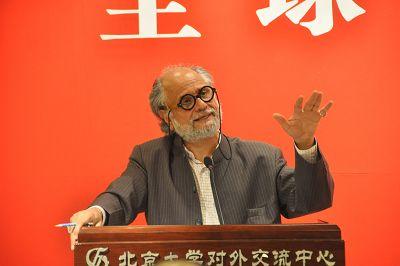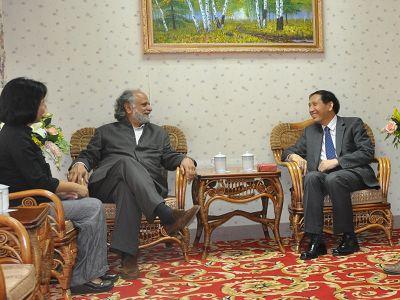Peking University, Beijing, May 21, 2010: On the afternoon of May 18, professor Homi K. Bhabha, renowned theorist of post-colonialism and interdisciplinary researcher, gave an academic speech entitled The Humanities in an Age of Global Transition in Yingjie Overseas Exchange Center of PKU.
Prof. Homi Bhabha is Director of the Humanities Center at Harvard University, Ann F. Rothenberg Professor of Department of English, and senior adviser on the humanities to the president and provost of Harvard.He enjoys tremendous popularity in the field of study on colonial and post-colonial theory, cultural change and power, and cosmopolitism. His representative work includes Nation and Narration and The Location of Culture. Homi Bhabha s theory provides expansive discussion scope for all scholars of post-colonial studies, and extends new space for the exploration of literary and cultural criticism.

Prof. Homi K. Bhabha
The speech was divided into four parts: crossing cultural boundary, undefined boundary of globalization, the humanities, and globalized theory and poetics. In the first part, Prof. Homi Bhabha pointed out that the cultural boundary is not transparent by illustrating mind crossing boundary with examples of Goethe and Coetzee. He put forward the concept of spectral sovereignty, which shows the loss of national sovereignty and the flexibility of the spectral of sovereignty in various forms. Therefore, globalization is a complicated phenomenon. In the second part, he outlined global discourse, brought forward the concept of partial, and analyzed its contradiction with pluralism. From this perspective, post-modernism is not fragments, but a theory to face the fragmentation, while globalization is not as simple as polarization. In the third part, Prof. Homi Bhabha mainly discussed about the impacts that the humanities can have n the partial and interstitial context of globalization today. He claimed that the tension in knowledge production of the humanities exactly demonstrates its basic contribution to public affairs. What the humanities are to build are communities rather than models in scientific system. In the last part, he read one poem of an American poet Adrienne Rich onthe theme of memory. He shared the idea that the humanities always go beyond human anticipation, because they focus not only on power discourse like freedom, equality, justice, and righteousness, but also on social affection like shame, humiliation, anger, violence, and passion, thus creating a community culture based on moralities transcending national law and social status.

Prof. Homi Bhabha and Prof. Zhang Guoyou, Vice Chairman of PKU Council
After the speech, students on the spot asked questions about value of post-colonial discourse in the Chinese context, problems of Hong Kong colonial and post-colonial periods, etc., and had further discussion with Prof. Homi Bhabha.
Extended Reading:
2010 witnesses the centennial of the Department of Chinese Language and Literature of PKU. Knowledge and wisdom originated 100 years ago spread from one generation to another. From Department of Chinese Literature of the Imperial University of Peking in 1910 all the way forward to the biggest Chinese department with the most extensive disciplines all over the country nowadays, a history of the development of the discipline is seen with ups and downs while always keeping the innovative spirit.
Teachers and students of the Chinese Department of PKU have shouldered responsibilities as pioneers in all aspects since the establishment of the department in 1910s. They made contribution to the national liberation and construction starting from the New Culture Movement and the May Fourth Movement. As a faculty of humanities with famous celebrities and solid academic background, the department has absorbed and fostered a great deal of distinguished masters and scholars, such as Lin Shu, Chen Duxiu, Lu Xun, Liu Shipei, Wu Mei, Zhou Zuoren, Huang Kan, Qian Xuantong, Yang Zhensheng, Liu Bannong, Hu Shi, Sun Kaidi, Luo Changpei, Yang Hui, You Guo en, Wang Li, and Feng Huanjun.
The Chinese Department now has 4 majors for undergraduates, 5 national key disciplines, 7 doctoral programs, 11 master programs, and a number of research centers as well as key national bases for education and scientific research.
Translated by: Xi Hui
Edited by: Jacques
Source: PKU News (Chinese)





